
Delphacidae is a family of planthoppers containing about 2000 species, distributed worldwide. Delphacids are separated from other "hoppers" by the prominent spur on the tibia of the hindleg.

Dictyopharidae is a family of planthoppers, related to the Fulgoridae. The family comprises nearly 760 species in more than 150 genera which are grouped into two subfamilies, Dictyopharinae and Orgeriinae.
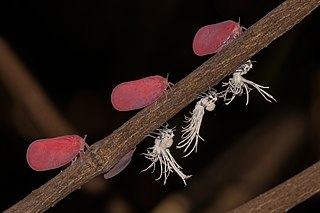
Flatidae are a family of fulgoroid planthoppers. They are cosmopolitan in distribution and are distinguished from others in the superfamily by a combination of characters. Like all other planthoppers, they suck phloem sap of plants. Some species are known to communicate with vibrations through the plant stems. Communication may be with mates, or with ants that tend the nymphs, protecting them and gathering honeydew secretions. Adults of some species have brightly coloured forewings which are tougher and known as tegmina unlike the membranous hindwings which are used for flight. Although a few can be identified by their coloration, most species requires dissection and examination under a microscope with access to literature on already described species.

Penthimia is a genus of leafhoppers belonging to the family Cicadellidae subfamily Deltocephalinae.
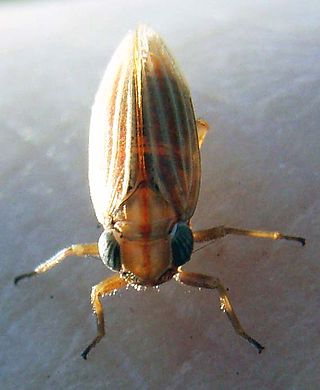
Caliscelidae is a family of planthoppers, sap-sucking insects that belong to the order Hemiptera, suborder Auchenorrhyncha and superfamily Fulgoroidea. They are somewhat anomalous and have often been included within the family Issidae. Studies made in 2013 of the phylogeny of the Issidae and other groups using molecular techniques support the treatment of the group as a separate family. Sexual dimorphism can be marked. Some members of the family are called piglet bugs due to the shape of their snout. A particularly aberrant genus described in 2011 from India, Formiscurra, has males that resemble ants.

Euscelis is a leafhopper genus in the subfamily Deltocephalinae.

Aphrophora is a genus of spittlebugs in the family Aphrophoridae. There are at least 80 described species in Aphrophora.

Eupteryx is a genus of leafhoppers in the family Cicadellidae.

Scaphoideini is a tribe of leafhoppers. There are 64 genera and over 600 described species in Scaphoideini.
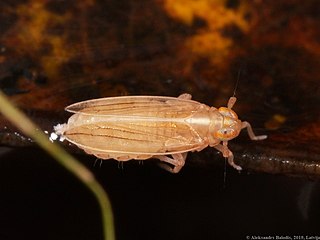
Kelisia is a genus of delphacid planthoppers in the family Delphacidae. There are more than 50 described species in Kelisia.

The Hysteropterinae are a subfamily of bugs in the family Issidae, based on the type genus Hysteropterum. Species in 59 genera have been recorded in Europe, Africa, and Asia. One species, Agalmatium bilobum, is now also found as an invasive species in the United States, especially in California.
Jassargus is a genus of leafhoppers belonging to the family Cicadellidae. The genus was first described by Zachvatkin in 1934. The species of this genus are found in Europe, Asia, Algeria, Greenland and Canada.

Aphrodes is a genus of leafhoppers. The species of this genus are found in Eurasia and North America.
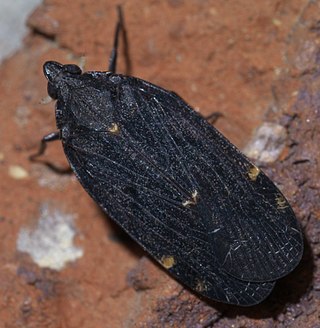
Cixidia is a genus of true bugs belonging to the family Achilidae.
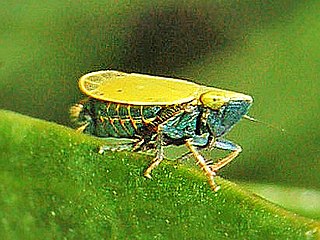
Verdanus is a genus of true bugs belonging to the family Cicadellidae.

Psammotettix is a genus of true bugs belonging to the family Cicadellidae. The species of this genus are found in Eurasia and North America

Delphacini is an important tribe of planthoppers with a world-wide distribution.

Balclutha is a genus of leafhopper that feed on grasses. They have a cosmopolitan distribution with over 100 species. The species feed primarily on grasses and sedges and can shift into cereal crops causing some economic damage especially by transferring plant viruses. The genus is named after Balclutha in Scotland.

















